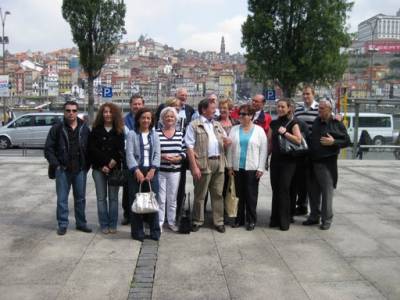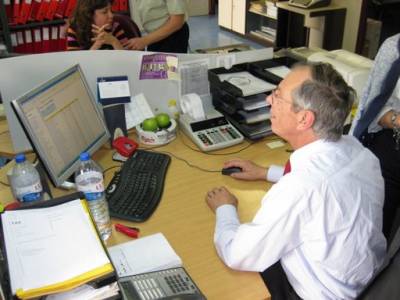Why do Ship Suppliers need to care about the new EU-systems for tobacco traceability
N. Proios, Member of the OCEAN Working Group on Customs, Taxation and Tobacco says ship supply is ready to help eliminate the illicit trade in tobacco products
OCEAN, the European Ship Suppliers Organization, supports the European Union and the World Health Organization (WHO) in their efforts to eliminate the illicit trade in tobacco products. As N. Proios, Members of OCEAN's Working Group for Veterinary and Health Matters explains, the close cooperation between the European Commission and the European Ship Supply Industry ensures that the new EU-system achieves its goals when it comes to serving the many foreign vessels calling EU-ports each day.
The Protocol to Eliminate Illicit Trade in Tobacco Products
The efforts of the EU are based on the WHO's Framework Convention on Tobacco Control (FCTC)'s Protocol to Eliminate Illicit Trade in Tobacco Products. It is an international treaty from 2012, ratified by the EU in 2016, which aims to eliminate all forms of illicit trade in tobacco products through a package of measures.
Why was the action needed, according to the EU and the WHO?
The WHO and the signatories of the treaty, including the EU, believe that the "illicit trade poses a serious threat to public health because it increases access to – often cheaper – tobacco products, thus fueling the tobacco epidemic and undermining tobacco control policies. It also causes substantial losses in government revenues, and at the same time, contributes to the funding of international criminal activities". It required the EU to set up a traceability system.
What actions has the EU undertaken?
On 3 April 2014, the European Parliament and the Council adopted the Tobacco Products Directive
How is the European ship supply industry concerned?
European ship chandlers supply vessels worldwide. Whatever the vessel or its crew may need, it can be found in the vast assortment of the chandler. In other words, the ship supplier is required to deal with numerous different commodities to meet all possible requirements. A ship supplier will also deliver tobacco, cigarettes and cigars amongst the thousands of other products, as specified in the vessels' order.
Why is speed to vessel so important?
Generally speaking, modern shipping requires only one day, or even hours, in port before vessels head to the high seas again. This requires the ship supplier to act fast and reach the vessel with all required items (amongst which may be a few cigarettes, limited in quantities). Speed is of the essence, as any delay costs the vessel more time and money. It is, therefore, crucially important, that and processed and procedures that ship suppliers undertake, before or during delivery to the vessel, as streamlined and optimised as possible. Everything must work like clockwork.
Goals of the new system
The EU tracking system has several basic aims:
- To restrict the supply of artificially cheap, illegally traded tobacco products
- To protect the health of EU citizens
- To support those legally trading within the industry
The Traceability System's Requirements
The requirements of the system are strict and are designed to be hard to forge by those involved in illegal trading. These requirements include:
(1) All tobacco packets placed on the EU market will need to carry a traceability marking, a so-called 'unique identifier.' This marking will have information on the location, the date of manufacture, destination, etc. All product movements will be recorded, from the manufacturer to the last level, just before the packs are sold in the first retail outlet. Each unique identifier has a barcode or some form of data carrier that allows public authorities to read the information using handheld devices, such as scanners or smartphones. It is important to stress that the task of issuing a part of the unique identifier is the responsibility of each Member State individually. Each Member State has appointed a national ID issuer, the entity responsible for issuing unique identifiers, and registering economic operators, facilities and machines in the system.
(2) The tracking features clearly define the timelines for reporting and prescribing a specific format for individual reports which must be delivered to the EU Member States. The system is designed to provide high-quality data, which in turn will enable the Member States and the Commission to effectively control the supply chain of tobacco products and better detect the instances of illicit trade.
(3) Packaging to include a tamper-proof security feature for authenticity verification
These elements allow economic operators to record the movement of tobacco products through the supply chain, thereby tackling illicit trade. The data collected during this tracking process can then be given to EU authorities and stored by approved bodies for enforcement purposes. The authenticity markings also allow consumers to be sure that what they're buying is from a reputable supplier.
Recording/transmission of product movements
In consultation, the OCEAN was interested in gaining clarification as to who is required to record any of the tobacco movements as they move from manufacturer to the final retail outlet. The EU Commission clarified "that all economic operators involved in the trade of tobacco products, from the manufacturer to the last economic operator before the first retail outlet, record the entry of all unit packets into their possession, as well as all intermediate movements and the final exit of the unit packets from their possession." (Article 15(5) Directive 2014/40/EU).
Reporting requirements of commercial vessels or cruise ships
Asked by OCEAN to provide further details on how the reporting requirements should be carried out for commercial vessels and cruise ships, the EU Commission clarified: "Where it is determined that the product will be placed on the Union market (e.g., shops on cruise ships that operate exclusively in EU waters), a dispatch message with destination 'retail outlet' must be recorded in the traceability system and the vessel/ship shop must acquire a Facility-ID (type: 'retail outlet').
How to determine the competent ID issuer if a ship shop opens several times during one cruise and the ship travels through territorial waters of different Member States?
As a solution, manufacturers (and economic operators) should turn to the ID issuer competent for the Member State on whose territory the tobacco products are loaded onto the vessel/cruise ship. Where it is determined that the product will be made available to consumers outside of EU waters, a dispatch message for exports must be recorded in the traceability system and there is no need for the vessel/ship shop to acquire a Facility-ID. The 'final destination address field' in the corresponding dispatch message should include the vessel / cruise ship identification and the port from where the vessel/ship departs (or, alternatively, the homeport of the vessel/ship).
Reporting obligations of ship suppliers
We also enquired about the reporting requirements for ship suppliers.
The EU Commission clarified:
- Where ship suppliers move tobacco products directly from their warehouse to the sea-going vessel: No reporting obligations (as merely involved in the transport products between warehouses and vessels)
- Where ship suppliers engage in transloading activities, so where they operate the warehouses from which products are dispatched to vessels, the ship suppliers must report on the arrival to and dispatch from these warehouses. Therefore, ship suppliers must also obtain the relevant economic operator and facility identifier codes.
In Summary
The illicit sale of tobacco is a major problem across the world, and the tobacco traceability system is a major weapon to be used in tackling the issue. With an uncompromised security and identification system in place for tobacco products, those looking to profit from illegal tobacco sales will find their task much more difficult in the years to come.
And whilst the system is not yet fully in place, that looks set to change in the near future for all types of tobacco. Once it has, EU countries will have a much clearer picture of the tobacco products that are bought and sold within their borders and be protected from the huge loss in revenues that illicit trade creates.
Photo by Afif Kusuma on Unsplash




